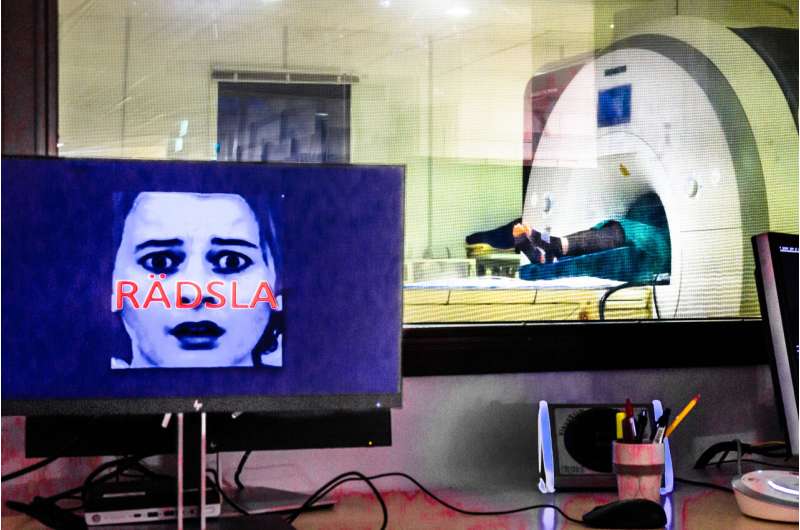This article has been reviewed according to Science X's editorial process and policies. Editors have highlighted the following attributes while ensuring the content's credibility:
fact-checked
peer-reviewed publication
trusted source
proofread
The brain's cannabinoid system protects against addiction following childhood maltreatment, study shows

High levels of the body's own cannabinoid substances protect against developing addiction in individuals previously exposed to childhood maltreatment, according to a new study from Linköping University in Sweden.
The study is published in Molecular Psychiatry. The brains of those who had not developed an addiction following childhood maltreatment seem to process emotion-related social signals better.
Childhood maltreatment has long been suspected to increase the risk of developing a drug or alcohol addiction later in life. Researchers at Linköping University have previously shown that this risk is three times higher if you have been exposed to childhood maltreatment than if you have not, even when accounting for confounds from genetics and other familial factors.
"There's been a lot of focus on addiction as a disease driven by a search for pleasure effects and euphoria, but for many it has more to do with the drugs' ability to suppress negative feelings, stress sensitivity, anxiety and low mood. Based on this, we and other researchers have had a theory that if affected in childhood, the function of the brain's distress systems is altered, and that this may contribute to addiction risk in adulthood," says Markus Heilig, professor and director of the Center for Social and Affective Neuroscience, CSAN, at Linköping University and consultant at the Psychiatric Clinic of the University Hospital in Linköping.
Endocannabinoids, i.e. the body's own cannabis-like substances, are an interesting player in this context. The endocannabinoid system plays an important part in regulating reactions to stress and discomfort. Recent research suggests that this endogenous system may function as a stress buffer.

The researchers behind the study aimed to investigate possible mechanisms behind susceptibility or resilience to developing substance use disorder later in life after exposure to childhood maltreatment. One difficulty in research is that people who develop problems later in life tend to overreport negative life experiences when questioned about earlier events. The researchers therefore used psychiatric care registers of children and young people having been treated for traumatic childhood experiences to find study participants with objectively and prospectively documented exposure.
The study included about 100 young adults divided into four equal sized groups: individuals who had been exposed to childhood maltreatment and had developed an addiction, individuals who had been exposed but had not, individuals who had not been exposed but had developed an addiction, and individuals who had neither been exposed nor developed an addiction. The researchers measured endocannabinoid levels in participants' blood and carried out several experiments to test stress reactions. The participants' brains were also scanned using magnetic resonance imaging (MRI), while their reactions to social stimuli were tested.
It turned out that one group stood out compared to the other three: the group that had experienced childhood maltreatment but had not later developed an addiction. The researchers refer to this group as "resilient." In comparison with the other groups, this group showed increased function of the endocannabinoid system as well as different brain activity. Surprisingly, the resilient group differed most from the control group, which had not been exposed to childhood maltreatment, nor had any addictions.
Faced with emotional social stimuli, the resilient group showed higher activity in three areas of the brain. Two of these areas are part of a brain network that focuses attention and cognitive abilities on what is important at the moment and modifies individuals' behavior according to the situation at hand. The third area of the brain is in the frontal lobe and is associated with regulating emotions. This area communicates extensively with other areas in the brain that process emotions. In comparison with other animals, humans have a well-developed frontal lobe that regulates impulses and emotions, for instance by suppressing fear impulses in situations where fear is not relevant.
"Increased activity in certain areas of the brain in the resilient group, which had not developed an addiction despite childhood maltreatment, may be linked to a more adaptive way of reacting to emotional social information. We can see that also in a resting state they show increased communication between the frontal lobes and other parts of the brain, which could indicate that this group has better emotional regulation," says Irene Perini, staff scientist at CSAN at Linköping University.
A question this discovery raises is whether the resilient group had a high endocannabinoid system function from the outset, or whether they were better able to activate the system in response to stress, thereby avoiding long-term consequences of childhood maltreatment. Because of its cross-section nature, this is not possible to determine from the present study.
More information: Resilience to substance use disorder following childhood maltreatment: association with peripheral biomarkers of endocannabinoid function and neural indices of emotion regulation, Molecular Psychiatry (2023). DOI: 10.1038/s41380-023-02033-y





















